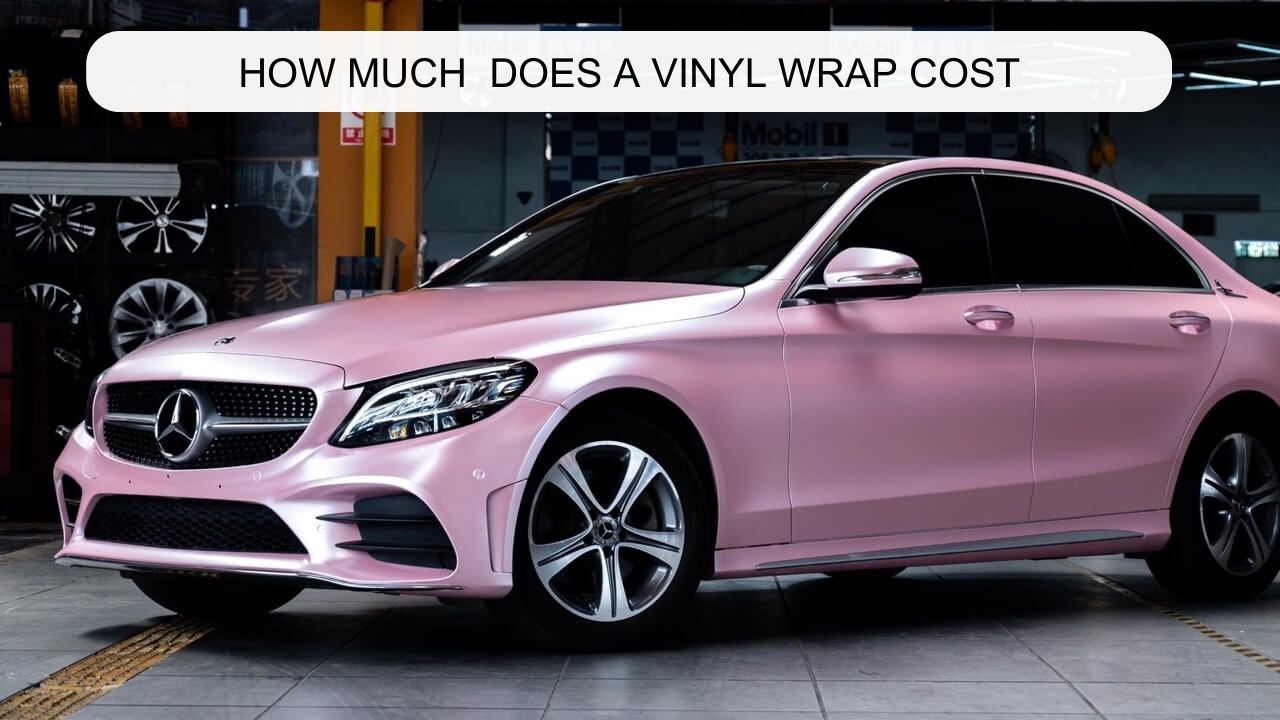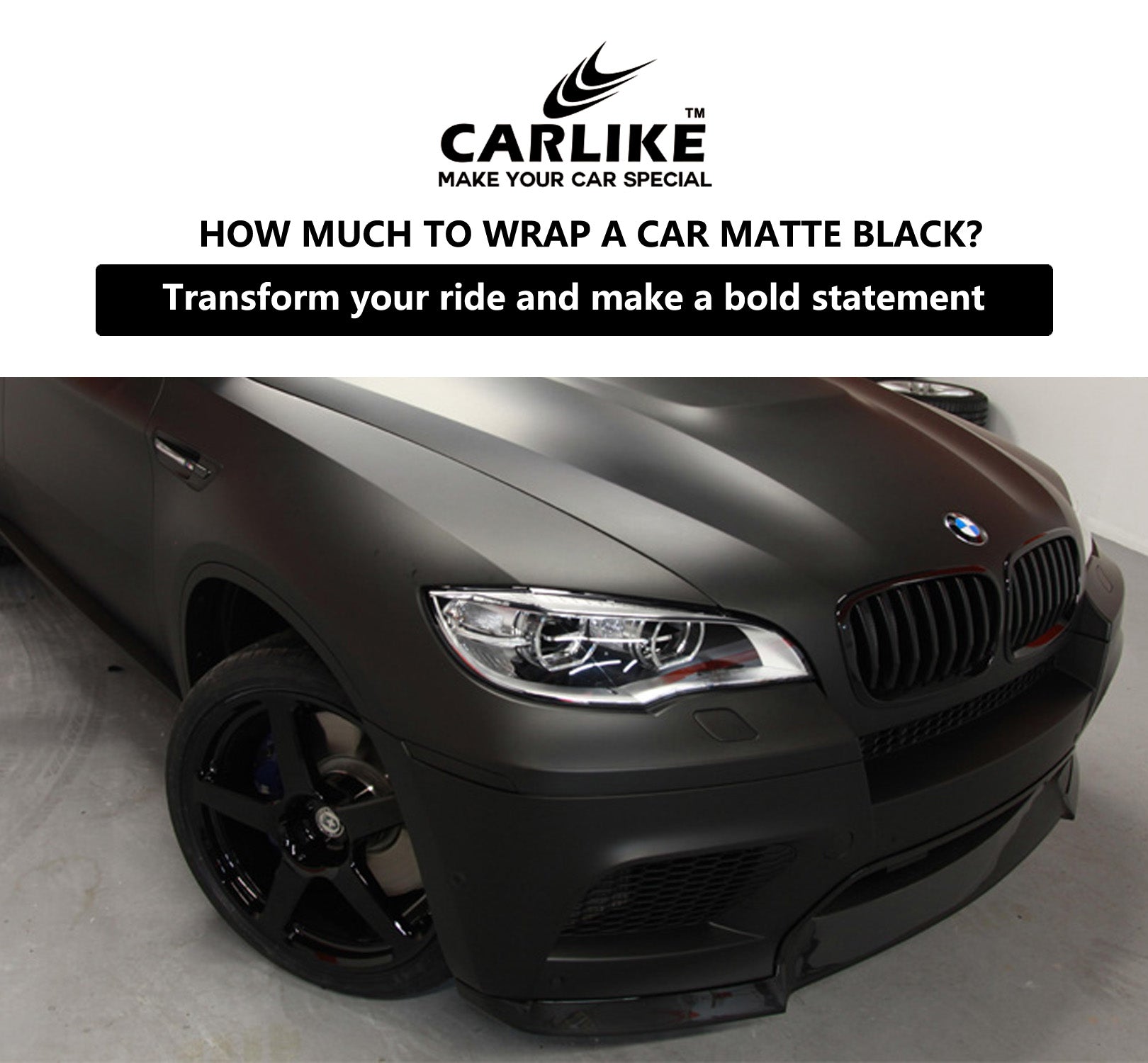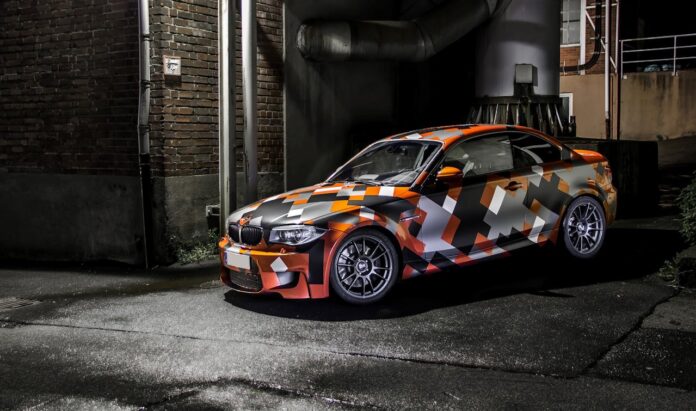How Much to Wrap a Car? The cost to wrap a car typically ranges from $2,500 to $5,000. This price can vary depending on the size of the vehicle, the complexity of the design, and the quality of the materials used.
Car wrapping is a popular way to give your vehicle a new look without the cost of a full paint job. It also offers protection for your car’s original paint and can be easily removed if desired. We will discuss the factors that affect the cost of car wrapping and provide some tips for finding the best deal.
Whether you are looking to advertise your business or simply want to change the color of your car, car wrapping is a great option to consider.

Credit: www.reddit.com
Introduction To Car Wrapping
Car wrapping has become an increasingly popular trend among car enthusiasts and businesses looking to make a statement on the road. This innovative technique involves applying a vinyl film to the exterior of a vehicle, transforming its appearance and protecting the original paintwork. In this blog post, we will explore the popularity of car wraps and highlight the benefits of wrapping your car.
The Popularity Of Car Wraps
Car wraps have gained immense popularity in recent years, and it’s not hard to see why. Here are some reasons why car wrapping has become a favorite among car owners:
- Enhanced aesthetics: Car wraps offer a wide range of color options, finishes, and textures that can give your vehicle a unique and eye-catching look. Whether you want a sleek matte finish or a vibrant metallic sheen, car wrapping allows you to customize your car’s appearance to match your personal style.
- Protection for the original paintwork: The vinyl film used in car wraps acts as a protective layer, shielding your car’s paintwork from scratches, UV rays, and other environmental damage. This helps maintain the resale value of your vehicle and keeps it looking new for longer.
- Temporary or long-term customization: Unlike traditional paint jobs, car wraps can be easily removed without damaging the original paintwork. This makes them a popular choice for individuals who want to change the look of their car temporarily or for businesses that need to display temporary branding or advertisements.
- Cost-effective alternative to paint: Car wraps are generally more affordable than a full paint job, making them an attractive option for car owners on a budget. Additionally, the application process is quicker, meaning less downtime for your vehicle.
Benefits Of Wrapping Your Car
Wrapping your car goes beyond just aesthetics. Here are some additional benefits of car wrapping:
- Preserves the original paintwork: Car wraps provide an extra layer of protection to your vehicle’s paint, preventing it from fading or getting damaged by harsh weather conditions or minor scratches.
- Easy maintenance: Car wraps are easy to clean and maintain. Simply wash your wrapped car with mild soap and water, avoiding abrasive materials that may scratch the vinyl film.
- Residual value: If you decide to sell your car in the future, having a well-maintained and protected paintwork can increase its resale value. Potential buyers will appreciate the pristine condition of the original paint underneath the car wrap.
Considering the growing popularity and numerous benefits, car wrapping has become a go-to option for car enthusiasts and businesses alike. Whether you want to give your car a fresh new look or protect its original paintwork, car wrapping offers a cost-effective and customizable solution.

Credit: www.carlawrap.com
Car Wrap Basics
Car wraps are an increasingly popular way to give your vehicle a fresh look without the expense of a new paint job. Whether you want to change the color, advertise your business, or protect the original paint, wrapping your car can be a cost-effective and versatile solution.
What Is A Car Wrap?
A car wrap is a large vinyl graphic or decal applied directly over the original paint of the vehicle. It can completely cover the exterior of the car, creating a new look or serving as a promotional tool for businesses. Car wraps come in a variety of colors, patterns, and finishes, providing a customizable option for personal and commercial use.
Materials Used In Car Wraps
Car wraps are typically made of a high-quality, adhesive vinyl material that is designed to withstand outdoor conditions and maintain its appearance for several years. The vinyl comes in different thicknesses and finishes, including matte, gloss, satin, and metallic. Additionally, specialized tools such as squeegees, heat guns, and cutting blades are used during the installation process to ensure a smooth and precise application.
Factors Influencing Wrap Costs
When it comes to wrapping a car, there are several factors that can influence the overall cost of the project. How Much to Wrap a Car? Understanding these factors can help you budget accordingly and make informed decisions. In this section, we will explore two key factors that play a significant role in determining wrap costs: vehicle size and type, and the complexity of the wrap design.
Vehicle Size And Type
The size and type of your vehicle are essential considerations when determining wrap costs. Generally, larger vehicles require more materials and labor to complete the wrap. The complexity of the curves and contours on larger vehicles can also impact the installation process, potentially increasing the time and effort required.
Additionally, the type of vehicle can influence the cost. For example, wrapping a compact car may be less expensive compared to a larger SUV or commercial van. This is because smaller vehicles typically have fewer surface areas to cover and may not require as much material.
Complexity Of The Wrap Design
The complexity of the wrap design is another significant factor influencing the overall cost. If you opt for a simple, single-color wrap, the cost may be lower compared to a more intricate design that includes multiple colors, graphics, or custom artwork.
Complex wrap designs often require more time and expertise to install accurately. The process may involve aligning patterns, cutting precise shapes, and ensuring the design seamlessly flows across different sections of the vehicle. All these factors can contribute to higher costs.
Moreover, specialty finishes or textures, such as metallic or matte wraps, may also increase the cost due to the additional materials and expertise required for application.
Considering the size and type of your vehicle, as well as the complexity of the wrap design, is crucial when estimating the cost of wrapping your car. Keep in mind that prices may vary depending on the location and the specific wrap shop you choose. It’s always recommended to consult with professionals who can provide accurate quotes based on your unique requirements.

Credit: carlikewrap.com
Types Of Car Wraps
When it comes to car wraps, there are various options to choose from depending on your preferences and budget. Understanding the different types of car wraps can help you make an informed decision before investing in this popular vehicle customization option.
Full Wraps Vs Partial Wraps
Full car wraps cover the entire vehicle, providing a complete transformation of its appearance. On the other hand, partial wraps focus on specific areas of the car, such as the hood, roof, or side panels, offering a more targeted customization approach.
Specialty Wraps: Chrome, Matte, And More
Specialty car wraps include unique finishes like chrome, matte, satin, and carbon fiber. These specialty wraps add a distinctive touch to your vehicle, allowing you to stand out on the road and express your individual style.
Preparation And Labor
When it comes to wrapping a car, proper preparation and skilled labor are crucial for achieving a flawless and long-lasting result. In this section, we will delve into the key aspects of preparation and labor involved in car wrapping.
Preparing Your Vehicle For Wrapping
Before the actual wrapping process begins, it is essential to prepare your vehicle adequately. This preparation ensures that the surface is clean, smooth, and free from any imperfections that may affect the adhesion of the vinyl wrap.
To prepare your vehicle for wrapping, follow these steps:
- Thoroughly wash your car to remove any dirt, dust, or debris.
- Inspect the surface for any existing damage, such as scratches, dents, or rust. These issues should be addressed before proceeding with the wrap.
- Remove any emblems, badges, or accessories that may interfere with the wrapping process.
- Ensure the surface is completely dry before the application of the vinyl wrap.
- If needed, consider using a primer or surface treatment to enhance the adhesion of the wrap.
By following these preparation steps, you create an optimal foundation for the vinyl wrap, allowing it to adhere smoothly and seamlessly to your vehicle’s surface.
Labor Intensity And Skill Required
Car wrapping requires a certain level of skill and expertise to achieve professional results. The labor intensity of the process depends on various factors such as the size and complexity of the vehicle, the type of wrap used, and the experience of the installer.
The process typically involves:
- Measuring and cutting the vinyl wrap material to fit the specific contours of the vehicle.
- Applying the vinyl wrap carefully, ensuring proper alignment and avoiding air bubbles or wrinkles.
- Using heat and pressure to activate the adhesive and mold the wrap to the vehicle’s shape.
- Trimming excess material and creating clean edges for a seamless finish.
Due to the precision required, it is recommended to entrust the wrapping process to a professional with experience in car wrapping. An experienced installer will possess the necessary skills and knowledge to handle the intricacies of the job, ensuring a high-quality and durable wrap.
Remember that the cost of labor can vary depending on the complexity of the vehicle and the expertise of the installer. It is advisable to obtain quotes from multiple professionals to compare prices and ensure you are getting the best value for your investment.
Cost Breakdown
When considering a car wrap, it’s crucial to understand the cost breakdown. This includes material costs and installation fees. By breaking down the expenses, you can make an informed decision about your car wrapping investment.
Material Costs
The material cost for wrapping a car varies based on the type and quality of the wrap. Vinyl wraps are the most popular and cost-effective option, with prices ranging from $1,500 to $5,000. Specialty wraps such as chrome or metallic finishes can cost between $6,000 and $8,000. Additionally, paint protection film is another option, priced between $2,000 and $5,000.
Installation Fees
Installation fees for car wrapping depend on the complexity of the job and the expertise of the installer. Basic installations typically cost between $1,000 and $3,000, while custom designs or intricate patterns can increase the price to $3,500 to $6,000. Full wraps for larger vehicles like vans or trucks may require an investment of $3,500 to $6,500 for installation.
Maintenance And Longevity
To ensure your car’s maintenance and longevity, consider investing in a professional car wrap. The cost of wrapping a car varies based on factors like the size and type of vehicle, ranging from $2,000 to $5,000. This protective layer can extend your car’s lifespan while providing a fresh, personalized look.
Caring For Your Wrapped Car
Maintaining your wrapped car is essential for long-lasting results. Regular cleaning and proper care will help preserve the quality of the wrap.
- Wash the wrapped car with a gentle detergent and soft cloth.
- Avoid using harsh chemicals or abrasive materials that can damage the wrap.
- Rinse the car thoroughly and dry it properly to prevent water spots.
How Long Does A Wrap Last?
The durability of a car wrap depends on various factors such as quality of the material, maintenance, and exposure to elements.
- A high-quality wrap can last up to 7 years with proper care.
- Factors like sunlight, weather conditions, and driving habits can affect the lifespan of the wrap.
By following care instructions and regular maintenance, you can extend the longevity of your car wrap.
Diy Vs Professional Wrapping
When considering wrapping your car, one of the first decisions to make is whether to go the DIY route or hire a professional wrapper. Both options have their own set of pros and cons, so it’s essential to weigh them carefully before making a choice.
Pros And Cons Of Diy Wrapping
- Pros: Lower cost, sense of accomplishment, flexibility in scheduling.
- Cons: Time-consuming, challenging for beginners, risk of improper installation.
Why Choose A Professional Wrapper?
- Pros: Expertise in installation, high-quality finish, time-saving.
- Cons: Higher cost, limited control over the process.
Additional Costs To Consider
When considering how much it costs to wrap a car, it’s important to account for additional expenses. These can include factors like the size of the vehicle, the type of wrap material, any design customization, and the professional installation fees.
Planning ahead and budgeting for these additional costs will ensure a smooth and successful car wrapping process.
When wrapping a car, it’s crucial to factor in the additional costs that may arise beyond the initial wrapping service. These extra expenses can impact your overall budget significantly.
Repairs And Modifications
- Repairs: Address any dents or scratches before wrapping.
- Modifications: Upgrades like a new paint job or bodywork.
Removal And Disposal Fees
- Removal: Costs associated with removing the existing wrap.
- Disposal: Proper disposal of old wrap material.
Saving On Your Car Wrap
Looking to save on your car wrap? Wondering how much to wrap a car? Explore cost-saving tips for car wrapping to get the best deal without compromising on quality. Get competitive quotes from multiple providers and consider opting for a partial wrap to reduce expenses.
Budgeting For A Wrap
Finding Value In Car Wrap Options
Saving on Your Car Wrap: Car wraps can be a cost-effective way to give your vehicle a fresh look. Budgeting for a wrap involves considering the size of your vehicle and the complexity of the design. Before committing, explore value in different wrap options. Research various providers and materials to save on your car wrap.
Frequently Asked Questions
How Much Does It Cost To Wrap A Car?
The cost to wrap a car can vary depending on several factors such as the size of the car, the type of material used, and the complexity of the design. On average, a full car wrap can cost anywhere between $2,500 to $5,000.
How Long Does It Take To Wrap A Car?
The time it takes to wrap a car can also vary depending on the size of the car and the complexity of the design. On average, a full car wrap can take anywhere from 1 to 3 days to complete.
Can You Wrap A Car Yourself?
While it is possible to wrap a car yourself, it is not recommended unless you have experience and the necessary equipment. Proper installation is crucial to ensure the wrap looks good and lasts a long time.
Is Wrapping A Car Better Than Painting It?
Wrapping a car is a great alternative to painting it. It can protect the original paint, is removable, and offers endless design options. Plus, it is generally less expensive than a high-quality paint job.
Conclusion
To wrap a car, costs vary based on size, material, and complexity of design. It’s crucial to research and compare quotes to find the best deal. A well-done car wrap can enhance aesthetics and protect the vehicle. Consider budget, quality, and durability when deciding on a car wrap.


